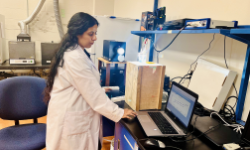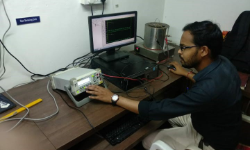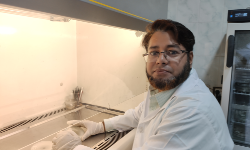News
» Go to news mainMcCain Foundation Post Doctoral Fellows in Sustainable Agriculture 2024 – 2025

Five new post doctoral fellows at the Faculty of Agriculture, including two alumni, will be addressing food insecurity, water quality and availability, soil degradation and more thanks to the generous funding of the McCain Foundation.
“As the world looks to our industry for solutions to the significant challenges facing the agricultural industry today, we know this funding will be key in pushing these research priorities forward,” said Dr. Heather Bruce, dean and campus principal Dalhousie Faculty of Agriculture. “This funding also enhances the research capacity of the Faculty of Agriculture in a significant way and has an incredible impact on sustainable agriculture in our region and beyond.”
The 2024-25 postdoctoral fellows were selected based on their research excellence, with a focus on sustainable agriculture, and clean, profitable, sustainable foods systems and will each receive $60,000 per annum.
POSTDOCTORAL FELLOWS 2024-2025
Craig MacEachern May 2024 – April2026
Xujie Li July 2024 – June 2026
Manmeet Kaur September 2024 – August 2026
Bapuso Mahadev Babar October 2024 – September 2026
Md Maniruzzaman Sikder November 2024 – October 2026
Craig MacEachern (Class of ’15, ’18, and ’24)
Research Focus: Integration of electrothermal cover crop termination methods into potato production as an alternative to traditional practices.
 Conventional cover crop termination, typically involving mowing, crimping, or herbicide application followed by tillage, has been effective in enhancing soil health. However, these methods often neglect the adverse effects of increased soil disturbance and herbicide best practices.
Conventional cover crop termination, typically involving mowing, crimping, or herbicide application followed by tillage, has been effective in enhancing soil health. However, these methods often neglect the adverse effects of increased soil disturbance and herbicide best practices.
Craig’s research aims to evaluate the effectiveness of electrothermal weed suppression as a more sustainable approach that supports conservation tillage principles while reducing reliance on agrochemicals.
The research directly supports McCain Foods' commitment to achieving 100 per cent regenerative agriculture in potato production by 2030. By minimizing soil disturbance and reducing agrochemical impacts, this study addresses several of McCain's key principles, including enhancing soil health, promoting biodiversity, and improving farm resilience.
With its potential to advance sustainable agriculture, the project aligns with several UN Sustainable Development Goals as well, including responsible production, climate action, and life on land.
“I hope to provide valuable insights into the viability of this innovative cover crop termination method, potentially setting a new standard for sustainable potato production,” he said.
Xujie Li (Class of ’13, ’15, and ’23)
Research Focus: Advancing sustainable poultry production through early-life programming and innovative feeding strategies.
 Xujie’s research specializes in integrating environmental management and nutritional factors to enhance poultry production.
Xujie’s research specializes in integrating environmental management and nutritional factors to enhance poultry production.
“My current focus is on developing innovative strategies to improve hatching performance and the adaptability of chicks to challenging environments,” he explained.
This work is crucial for advancing sustainable practices in the poultry industry, particularly in response to climate change and the growing demand for antibiotic-free products.
Xujie is exploring the potential of early feeding strategies using potato processing byproducts, such as potato peel, in newly hatched chicks. This innovative approach aims to accelerate gut development, essential for improving nutrient absorption and overall health in broilers.
MANMEET KAUR
Research Focus: Marine/agricultural waste assisted cost-effective nano fertilizer to enhance potato production and promote environmental sustainability
 Revenue from New Brunswick’s potato production is a vital part of the province's economy. The McCain Foundation, in collaboration with researchers and farmers, is making significant strides to improve potato production in a sustainable way. Substantial efforts are being put into developing novel biocompatible nano-fertilizers (NFs) to replace conventional fertilizers and boost potato production while promoting environmental sustainability.
Revenue from New Brunswick’s potato production is a vital part of the province's economy. The McCain Foundation, in collaboration with researchers and farmers, is making significant strides to improve potato production in a sustainable way. Substantial efforts are being put into developing novel biocompatible nano-fertilizers (NFs) to replace conventional fertilizers and boost potato production while promoting environmental sustainability.
“Carbon-based nano-fertilizers will be synthesized using a cost-effective and scalable "green" wet-chemistry approach using marine and agriculture waste,” explained Manmeet. “The aim is to develop potato-specific structure-property relationships of the carbon-based nano-fertilizers by tailoring the sizeshape and compositions.”
The impact of carbon-based nano-fertilizers on potato growth, quality and resistance to pests and diseases will be investigated and compared to that of conventional fertilizers.
The environmental impact and economic feasibility of carbon-based nano-fertilizers will also be assessed in contrast to currently employed commercial fertilizers to achieve sustainable potato production. This green pathway will utilize low-cost, renewable, and non-toxic precursors.
Transforming waste into valuable nano-fertilizers is not only an eco-friendly approach resulting in waste minimalization but also repurposes low-value waste into practical materials.
Bapuso Mahadev Babar
Research Focus: Development of wireless electronic nose for pathogen detection in potato storage units
 Potato retailers around the world suffer large losses due to bacterial soft rot disease. External signs of tuber infection do not appear until late in the infection process, at which point the pathogen is widespread, threatening the loss of a big volume of tubers, especially when stored in bulk.
Potato retailers around the world suffer large losses due to bacterial soft rot disease. External signs of tuber infection do not appear until late in the infection process, at which point the pathogen is widespread, threatening the loss of a big volume of tubers, especially when stored in bulk.
Internal symptoms become visible only after cutting the potato. There are a few disease identification techniques that require substantial infrastructure and physical contact, which are not suitable to find infected potatoes in storage units where most of the tubers are not accessible. An electronic nose (e-nose) or simple gas sensor is a device that interacts with the organic compounds emitted from unhealthy potatoes, generating a signal. These signals are further converted into quantifiable terms.
Bapuso will develop a wireless e-nose or gas sensor to detect compounds emitted by microorganisms in potato storage for early detection of disease outbreaks or spoilage in storage units.
Ultimately, a deployable version of the sensor powered by batteries would be installed in a potato storage unit, with data relayed to the unit manager's internet cloud to check sensor performance in real time.
Md Maniruzzaman Sikder
Research Focus: Assessment and mitigation of potato slug disease incidence through cover cropping practices
 During his research experience in plant science, Md Maniruzzaman developed a strong interest in working with above-and below-ground microbes and promoting sustainable crop productivity and developing eco-friendly disease management strategies.
During his research experience in plant science, Md Maniruzzaman developed a strong interest in working with above-and below-ground microbes and promoting sustainable crop productivity and developing eco-friendly disease management strategies.
During his doctoral studies Md Maniruzzaman and his team detected specific plant secondary metabolites involved in plant defense mechanisms and were able to pinpoint key members of root-associated rhizosphere microbiomes. Harnessing these microbes could be a basis for developing eco-friendly disease management strategies.
Together with four fellows from last year, a total of nine post docs have been funded at the Faculty of Agriculture thanks to the generous funding of the McCain Foundation.
Recent News
- Reimagining Student Engagement in a Changing Educational Landscape
- 2025 Public Impact Award.
- From Markets to Meals: Dalhousie Researcher Leads Global Food Systems Study
- Applications for the Fall 2025 Collide Validate
- Convocation 2025
- Agriculture students turn wool into warmth
- Connection, Passion and Purpose
- Tractor Safety Course instructor
